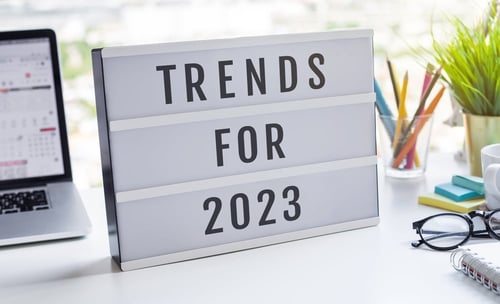
Metaverse technologies, 3D content, virtual reality (VR), and augmented reality (AR) promise the next level of interaction in the virtual and physical worlds, providing innovative new opportunities and business models. In fact, by 2026, Gartner predicts that 25% of people will engage at least one hour a day in a metaverse for work, shopping, education, social media, and/or entertainment.
As technology advances and becomes more immersive, brands see the potential in using this platform to solve business challenges. By leveraging 3D content, VR, and AR, brands can create unique experiences that engage with customers in ways never before possible.
The metaverse concept is an ever-expanding digital world where people, places, and objects are represented virtually to create immersive online experiences. This technology has allowed brands to innovate and develop increasingly sophisticated solutions that engage customers on a deeper level than ever before.
Through VR, AR, 3D content creation, and more, brands worldwide are embracing the metaverse to create unique customer experiences that can help improve their bottom line. This article will discuss how businesses are leveraging the metaverse's power to evolve their brands.
The metaverse and its potential uses for businesses
Brands are leveraging the metaverse to drive more effective marketing campaigns by providing unique customer experiences. For example, AR technology allows marketers to capture real-time data on how customers interact with products and services to optimize their ad campaigns. Additionally, VR can provide immersive product demos or tours that give customers a deeper understanding of the product or service they're considering.
Through virtual stores, virtual conferences, and virtual events, businesses can connect with customers in a way that has never been possible. This can increase brand engagement and loyalty and create new market opportunities.
How companies are already using the metaverse to advance their brands
Marketers are finding new ways to use metaverse technology to achieve tangible benefits. For example, retailers like Nike and Adidas have used the metaverse's cutting-edge technology to create virtual stores that customers can explore from their homes. By providing a more interactive shopping experience, these retailers are able to drive higher conversion rates and increase sales significantly.
Microsoft's HoloLens headsets debuted in 2016, allowing customers to become part of an AR and VR world. HoloLens creates a holographic image of a product that enables users to experience and experiment with 3D holographic images as though they are a part of their physical environment. This type of AR interaction has helped Microsoft build more meaningful relationships with customers and drive higher sales. Also in 2016, the augmented reality game, Pokemon Go, became an international sensation and demonstrated the potential of metaverse technology to drive customer engagement and revenue.
Sweedish furniture giant IKEA has used the metaverse to create an augmented reality app that allows customers to visualize how IKEA's furniture would look in their homes before they buy it. This technology helps reduce customer hesitation and provides a more immersive shopping experience.
In 2020, Apple added a new feature to their iPhones and iPads called LiDAR ((Light Detection and Ranging). This technology creates better depth scanning for better photos and AR and paves the way for mixed-reality headsets.
Disney has used metaverse technology to create a virtual theme park that customers can explore from home. This allows the company to increase engagement and loyalty while driving more sales and revenue. It has also created a virtual assistant-style application, Genie, which helps customers find their way around the park and provides information about attractions and services.
The potential to revolutionize the way that businesses interact with customers could also have a profound impact on the automotive industry. For example, automotive brands are looking to the metaverse to provide customers with virtual showrooms they can explore from their homes. This would enable customers to view automobile details and better understand the vehicle without having to visit a physical showroom. The metaverse could also be used to research new car designs and provide a new way for manufacturers to interact with suppliers and partners.
Thoughts on the future of the metaverse and its impact on brands
The metaverse is an ever-evolving platform that has already started to revolutionize how brands create customer experiences. As technology advances, more businesses recognize the value of leveraging the metaverse for marketing purposes. By creating more immersive experiences for customers, brands can reach a wider audience and engage with them on a deeper, more personalized level than ever before.
Recent Posts
Posts by Topics
- Brand Strategy (57)
- Brand Strategy Consulting (28)
- Brand Differentiation (27)
- Customer Experience (24)
- Brand Positioning (22)
- Marketing Strategy (9)
- Brand Extension Strategy (8)
- Customer Behavior (8)
- Brand Architecture Strategy (7)
- Brand Extension (7)
- Brand Growth (7)
- Brand Portfolio & Architecture (7)
- Brand Purpose (7)
- Brand Value Proposition (7)
- Brand Engagement (6)
- Brand Portfolio Strategy (6)
- Brand Storytelling (6)
- Rebranding Strategy (6)
- Brand Awareness (5)
- Brand Image (5)
- Branding (5)
- Rebranding (5)
- Technology (5)
- B2B Brand Strategy (4)
- Brand Experience (4)
- Value Proposition (4)
- Brand Extendibility (3)
- Brand Metrics (3)
- Brand Repositioning (3)
- Corporate Branding (3)
- Differentiation Strategy (3)
- Measurement & Metrics (3)
- Brand Engagement Strategy (2)
- Brand Portfolio (2)
- Brand Promise (2)
- Brand Voice (2)
- Digital Marketing (2)
- Digital and Brand Experience (2)
- Employee Brand Engagement (2)
- Brand Architecture (1)
- Brand Development (1)
- Brand Equity (1)
- Brand Identity (1)
- Brand Measurement (1)
- Brand Name (1)
- Brand Strategy Consultants (1)
- Brand Strategy Firms (1)
- Digital Strategy (1)
- Internal Branding (1)
- Messaging (1)


